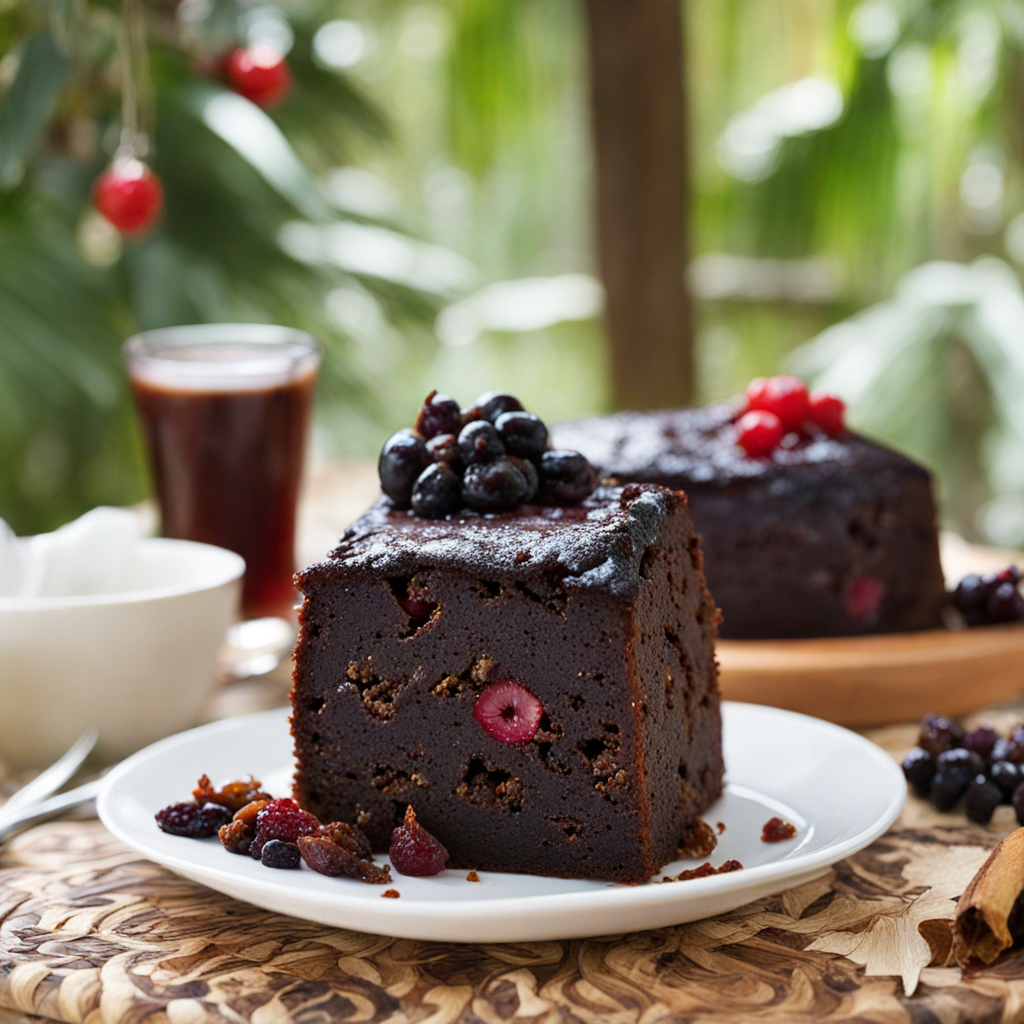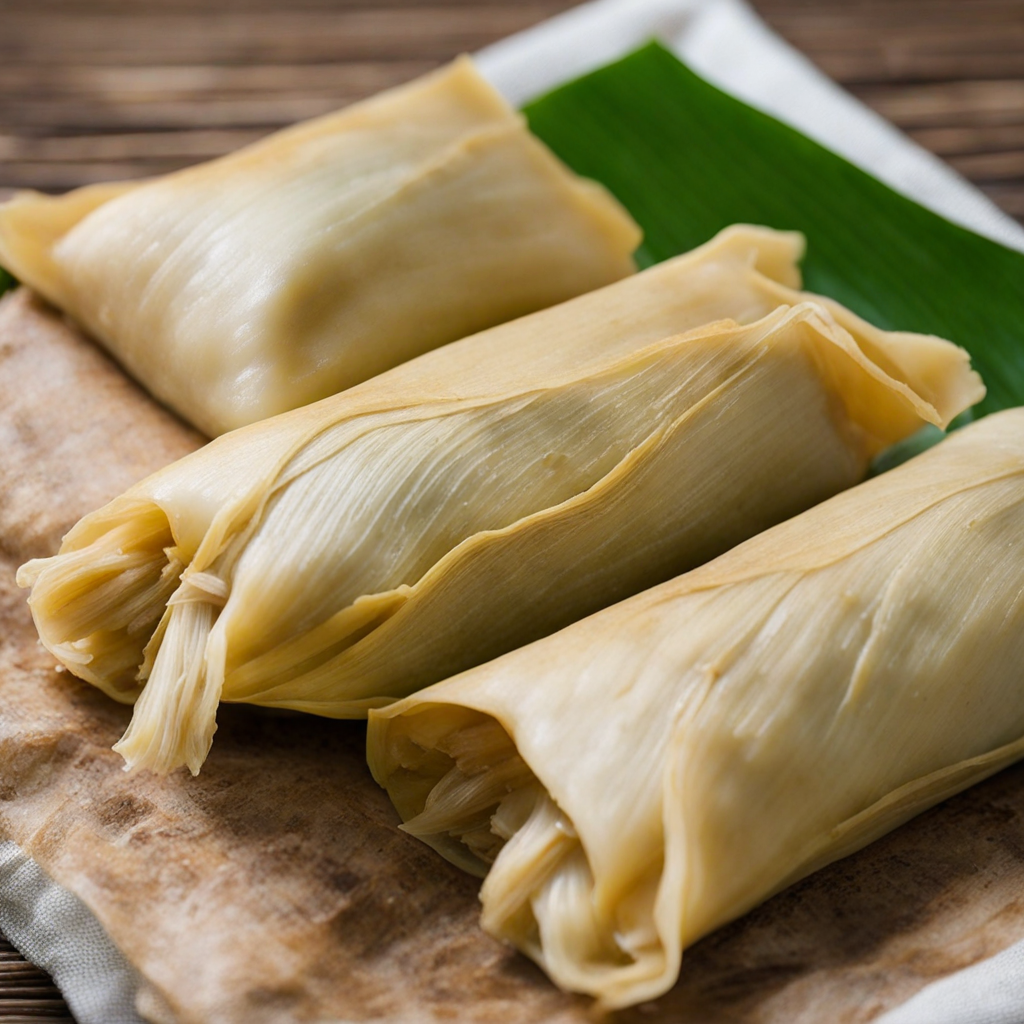Black Fruit Cake
Black Fruit Cake is a rich and indulgent dessert that embodies the vibrant culinary traditions of Belize. This cake is notable for its deep, dark color, which comes from a combination of molasses, brown sugar, and a variety of dried fruits, such as raisins, currants, and prunes. The fruits are often soaked in rum or wine for an extended period, allowing them to absorb the flavors and moisture, resulting in a moist, flavorful cake. The spices used in the cake, including cinnamon, nutmeg, and allspice, contribute to its aromatic profile, making every bite a sensory delight. One of the defining characteristics of Black Fruit Cake is its dense texture, which comes from the careful balance of ingredients. Unlike lighter cakes, this dessert is packed with fruit and nuts, making it a hearty treat that pairs well with a cup of coffee or a glass of rum. The cake is often adorned with a layer of marzipan or fondant, giving it an elegant finish that is perfect for special occasions and celebrations. In Belize, it is commonly served during the holiday season, symbolizing joy and festivity. As you take your first bite of Black Fruit Cake, you’ll experience a delightful explosion of flavors. The sweetness of the fruits harmonizes with the warm spices, creating a complex taste that is both comforting and exciting. The rich, moist crumb and the subtle hints of rum or wine elevate the cake to a level of sophistication that makes it truly unique. This cake is not just a dessert; it's a cultural experience that invites you to savor the essence of Belize’s culinary heritage.
How It Became This Dish
The History of Black Fruit Cake in Belize Origin and Early Influences Black fruit cake, a beloved holiday dessert in Belize, has a rich tapestry of history woven from various cultural influences. Its origins can be traced back to the British colonial era, intertwining with the culinary traditions of the Creole, Garifuna, and Mestizo peoples who inhabit the country. The cake itself is a variant of the traditional British fruitcake, which was historically made with dried fruits, nuts, and spices, often soaked in alcohol. However, the unique Belizean version has evolved over time, absorbing local flavors and ingredients, giving it a distinctive character. In Belize, the cake is typically made with a mixture of dark rum, molasses, and a variety of dried fruits such as raisins, prunes, and currants. The use of rum is particularly significant; rum production has deep roots in Belize, dating back to the colonial period when sugarcane became a lucrative crop. This local spirit not only enhances the cake's flavor but also ties it to the region's agricultural heritage. Cultural Significance Black fruit cake holds a special place in Belizean culture, particularly during festive occasions. It is traditionally associated with Christmas and is often served at weddings, anniversaries, and other celebratory events. The cake is not merely a dessert; it symbolizes togetherness and the sharing of good fortune among families and friends. During the Christmas season, the preparation of black fruit cake becomes a communal activity. Families often gather to mix the ingredients, with each member contributing their unique touch to the recipe. This practice fosters familial bonds and reinforces cultural traditions. The cake is typically baked weeks in advance, allowing it to mature and deepen in flavor. This aging process is steeped in anticipation, as families look forward to enjoying a slice of the cake during the holidays, often accompanied by stories of previous celebrations. In addition to its festive significance, black fruit cake reflects the multicultural heritage of Belize. The blending of ingredients and techniques from British, African, and Indigenous culinary practices embodies the spirit of Belizean identity. It serves as a reminder of the resilience and creativity of the people, who have adapted and transformed their culinary traditions over generations. Development Over Time The evolution of black fruit cake has seen it grow from a simple colonial dessert into a cherished culinary staple. In the early days, recipes were often closely guarded family secrets, passed down from generation to generation. The ingredients and methods varied by household, with each family adding their personal flair. The use of local fruits and spices has increased over time, with ingredients such as Belizean black rum and local nuts being incorporated into the mix. As Belize gained independence in 1981, there was a renewed interest in celebrating national identity, and black fruit cake became a symbol of that pride. Culinary festivals and competitions began to emerge, showcasing traditional dishes, including black fruit cake. These events allowed local bakers to demonstrate their skills and creativity, further solidifying the cake's status as a national treasure. In recent years, the cake has gained international recognition. Tourists visiting Belize are often introduced to this delightful treat, with many seeking recipes to take home. The popularity of black fruit cake has also led to the emergence of artisanal bakeries specializing in this beloved dessert, each offering their unique interpretations while remaining true to the traditional recipe. Modern Variations and Innovations While the classic recipe remains a staple, contemporary Belizean bakers have begun experimenting with new flavors and techniques. Some have introduced tropical fruits such as pineapple or mango, while others have incorporated spices like ginger and nutmeg, expanding the flavor profile of the cake. The rise of veganism and dietary restrictions has also led to adaptations of the recipe, with many bakers creating gluten-free or egg-free versions. Social media has played a significant role in the resurgence of black fruit cake, with platforms like Instagram and TikTok allowing bakers to showcase their creations to a global audience. This exposure has sparked interest in traditional Belizean foods, encouraging a new generation to explore their culinary heritage and experiment with traditional recipes. Moreover, the importance of black fruit cake extends beyond its taste; it has become a symbol of resilience and community spirit, particularly in the wake of natural disasters. Following Hurricane Dean in 2007 and Hurricane Lisa in 2022, many Belizeans rallied to support one another, and the sharing of food—especially cherished recipes like black fruit cake—became a means of healing and rebuilding community ties. Conclusion Black fruit cake is more than just a dessert; it is a cultural emblem of Belize that encapsulates the nation’s history, diversity, and communal spirit. Its evolution from a colonial import to a beloved national treasure reflects the resilience and creativity of the Belizean people. Whether enjoyed during the festive season or at significant life events, black fruit cake continues to bring people together, fostering connections and celebrating the rich tapestry of Belizean culture. As this culinary tradition continues to evolve and adapt, black fruit cake will undoubtedly remain a cherished part of Belizean life, linking past and present while inspiring future generations to preserve and innovate within their culinary heritage.
You may like
Discover local flavors from Belize







